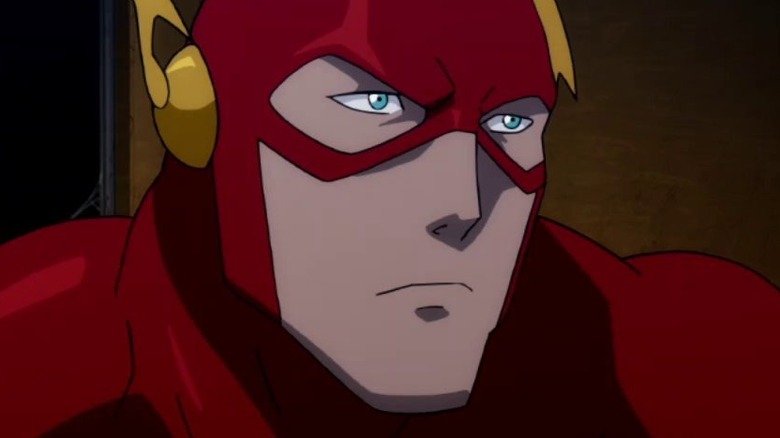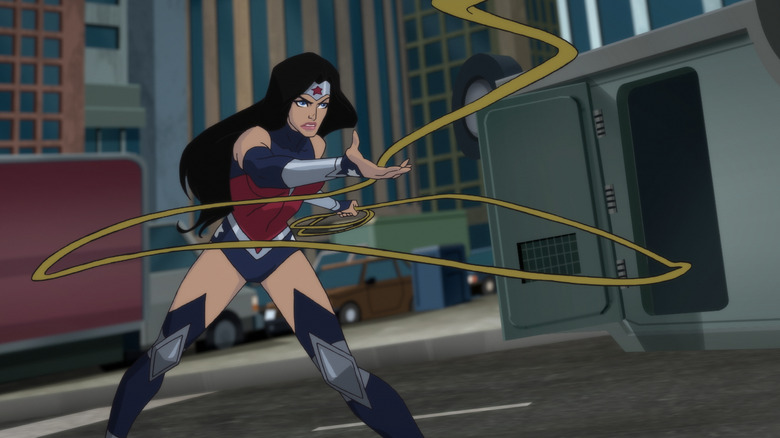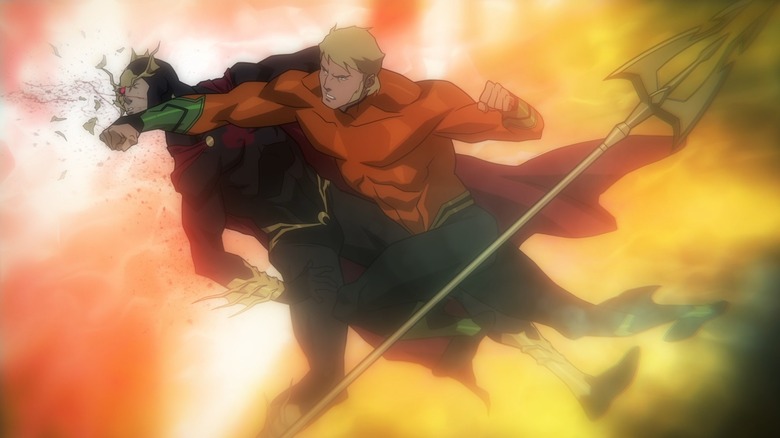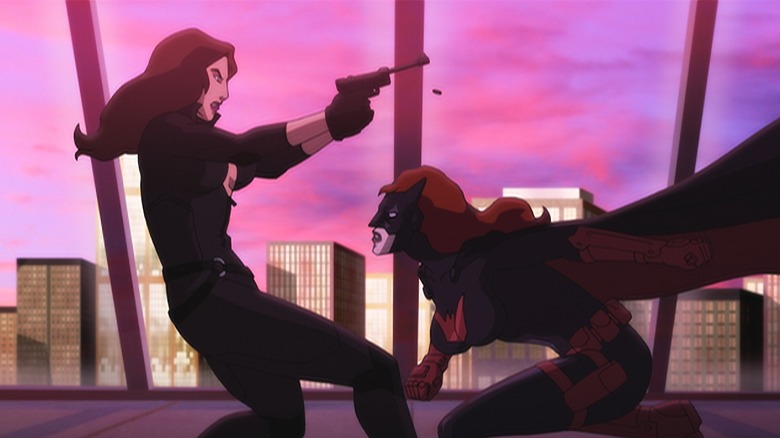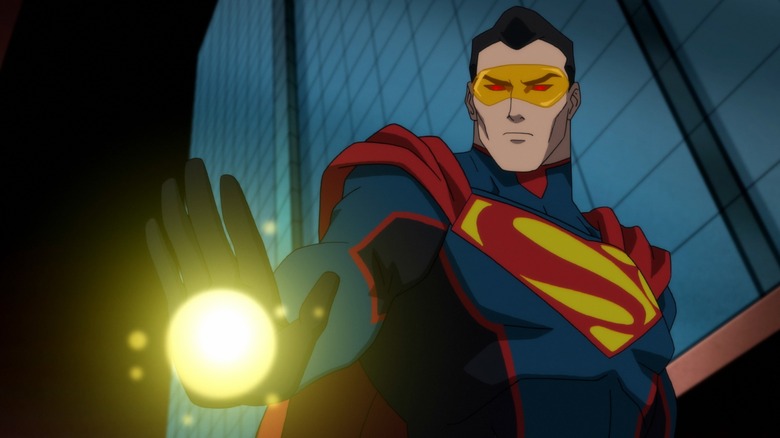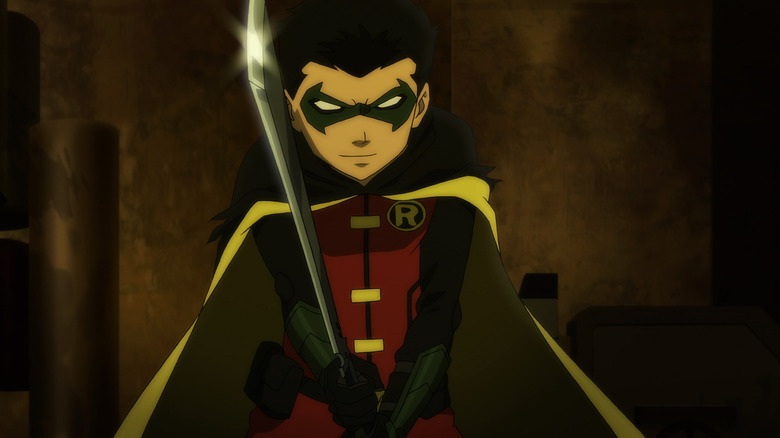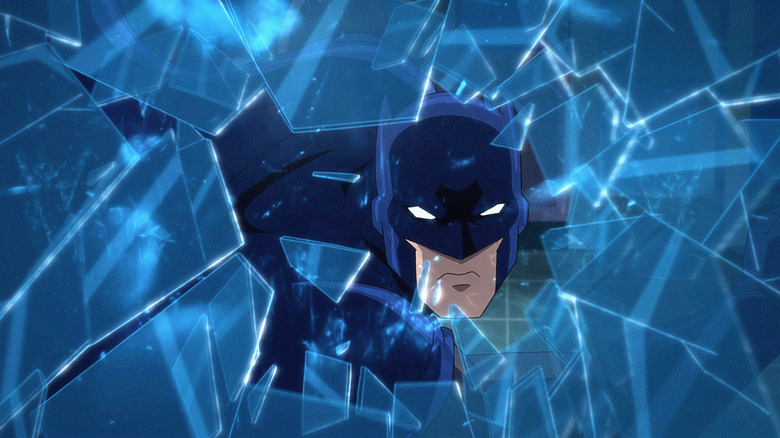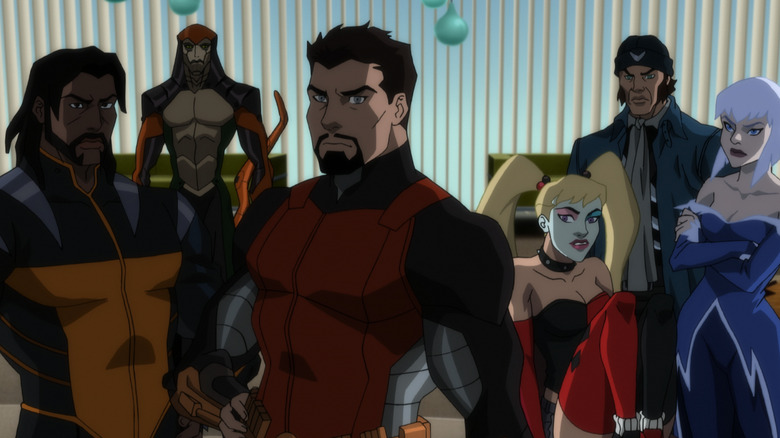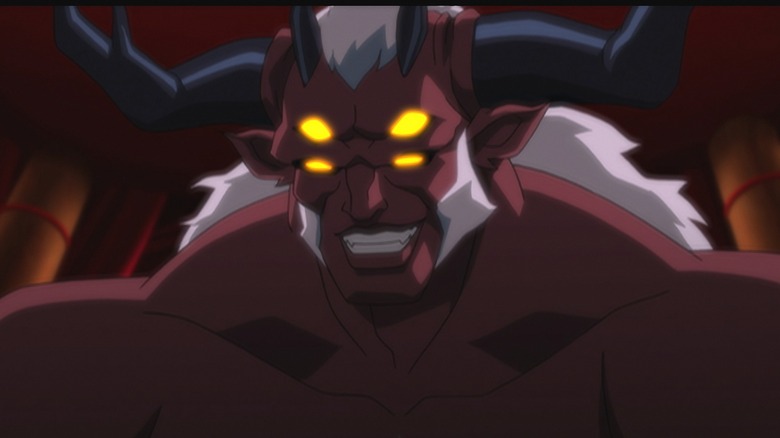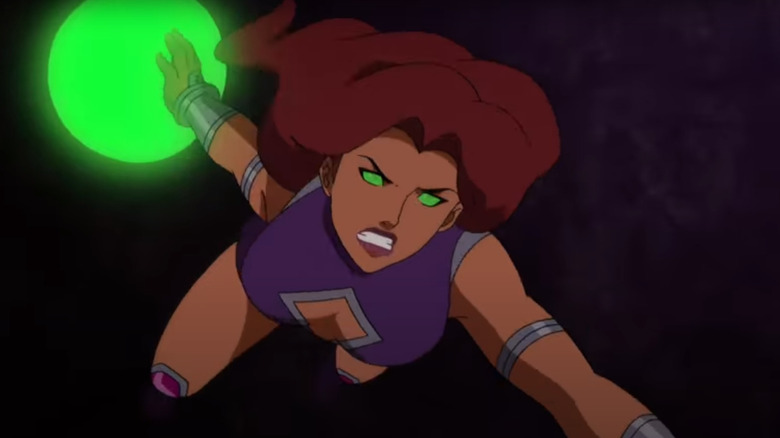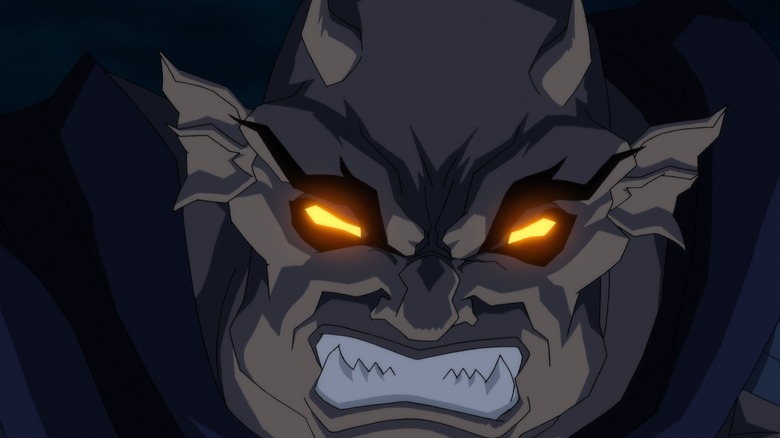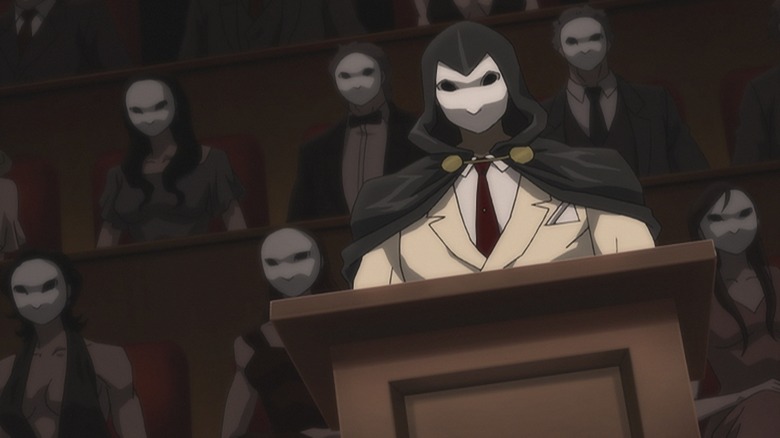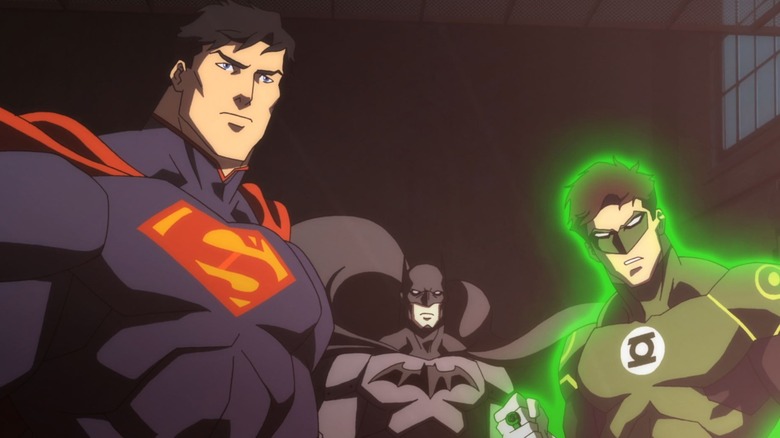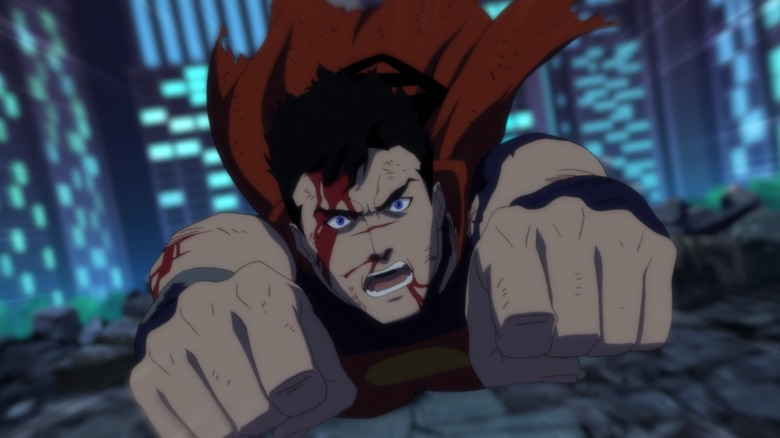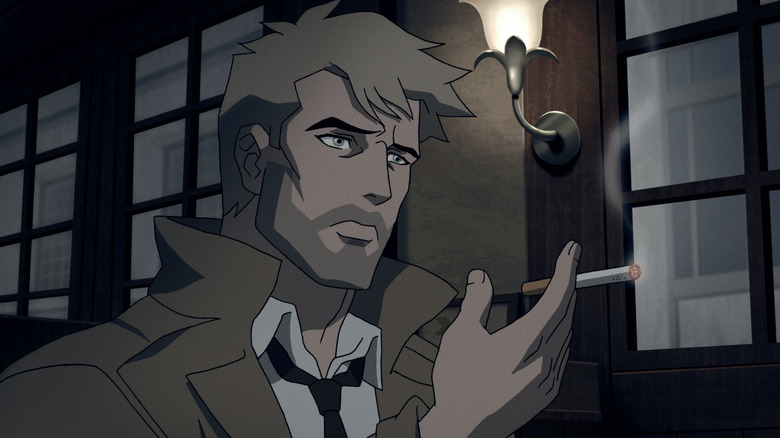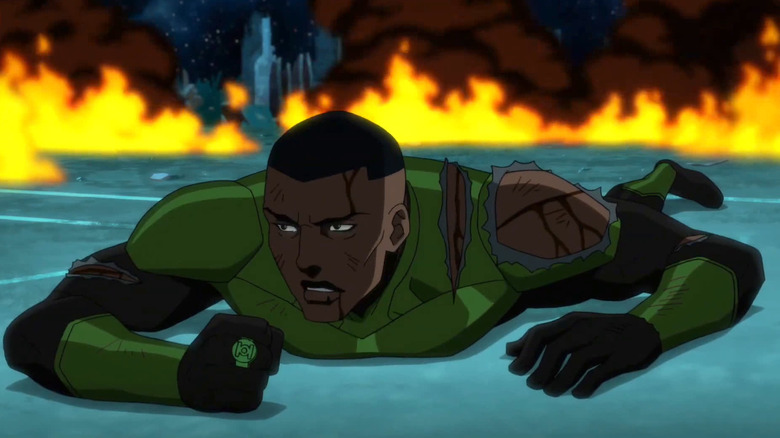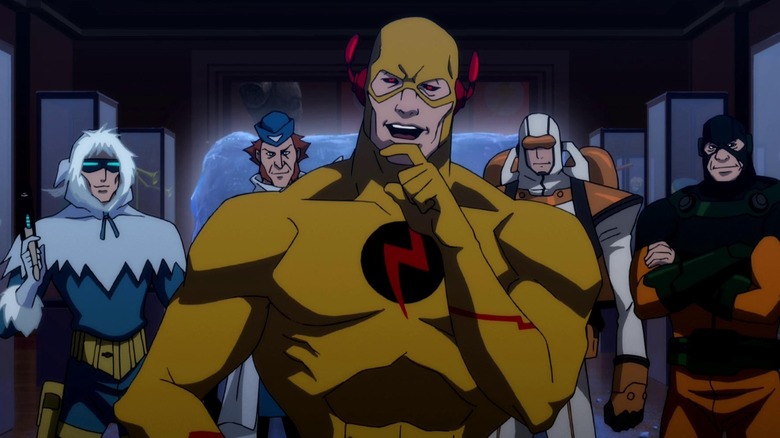Every DC Animated Movie Universe Movie Ranked, According To IMDb
In an era when superhero films and television shows frequently target mainstream audiences who maybe heard of a Crisis on Infinite Earths for the first time on an episode of a CW melodrama, The DC Animated Movie Universe (DCAMU) caters to a niche within DC comics fandom. The 16 interconnected straight-to-DVD projects do not try to please everyone, and there's something refreshing about that.
Partially based on the "New 52" comics timeline reboot from 2011, with a continuity that's unrelated to the DC Animated Universe (DCAU) or the several standalone DC Universe Animated Original Movies, the DCAMU begins with 2013's "Justice League: The Flashpoint Paradox," and ends with 2020's "Justice League Dark: Apokolips War."
Every entry ventures well into PG-13 territory. Some of them drift into the R-rated deep end with adult language and graphic violence. The "mature" content scans as eyeroll-inducing edgelord posturing...until John Constantine shows up. That's when the blood, guts, and naughty words become essential and delightful features of the series.
How does IMDb rank the DCAMU? Keep your eyes fixed here to find out.
16. Wonder Woman: Bloodlines (5.9)
Folks who remember 2017's live-action "Wonder Woman" will find the origin story portion of 2019's "...Bloodlines" instantly familiar. Longtime followers of Princess Diana might appreciate the nods to staple events and characters spanning a few decades' worth of Wonder Woman comics. Film and TV legend Rosario Dawson takes on the main role, and the supporting cast includes Michael Dorn of "Star Trek: The Next Generation" supplying the voice of Ferdinand the Minotaur.
The low IMDb audience score of 5.9 is a little misleading. Unfortunately, some individuals base their assessments of female-headlined endeavors on unrealistic, nebulous criteria. It also happens to be the case that the typical DCAMU consumer is more likely to get a rush out of seeing The Court of Owls — who first appear in early 2010s Batman comics — than an animated Julia Kapatelis, a professor of Greek mythology and Wonder Woman's benefactor during George Pérez's definitive 1980s Wonder Woman run.
As far as reviews from internet commenters go, the goalpost might be little wider and closer for the DCAMU's Batman movies.
15. Justice League: Throne of Atlantis (6.7)
In 2015, the world had not yet been introduced to the suave update on Aquaman embodied by Jason Momoa in the live-action DCEU, which might account for the comparatively low 6.7 IMDb average for "Throne of Atlantis."
Despite the best efforts of voice actor Matt Lanter, audiences were not totally enthralled by this film's more traditional iteration of mythic fish whisperer Arthur Curry. Plus, with only two films under its belt at this point, the DCAMU had yet to fully develop its proverbial sea legs. On the bright side, this one's got sharks and a tidal wave in it.
Though it's hardly a rousing success, we do have to give "Throne of Atlantis" credit for Sam Witwer's deliciously hammy take on Orm the Ocean Master. If the assignment is providing vocals for a deeply evil guy with the unironically goofy sobriquet "Orm the Ocean Master," then does it not make sense to lean all the way in?
14. Batman: Bad Blood (6.8)
Loosely inspired by Grant Morrison's 2009 "Batman and Robin" series, 2016's "Batman: Bad Blood" resonates like an extended pilot for a TV show focused on Batman's lieutenants. This wouldn't be a problem, except "Bad Blood" is the last Bat-centric installment in the DCAMU until the third-to-last film in the entire timeline — 2019's "Batman: Hush."
The first eight entries in the DCAMU devote lots of screen time to introducing new characters; we can unscientifically estimate that roughly 35 percent of this series is devoted to origin stories. While "Bad Blood" provides a fine source of Gotham-based intrigue and action, it's also perhaps the DCAMU's worst example of cultivating the audience's investment in crimefighters who barely ever appear again in the series.
It may amuse "Firefly" fans to know that, like "Son of Batman" from 2014, "Bad Blood" reunites former castmates Sean Maher and Morena Baccarin as the voices of Nightwing and Talia al Ghul. However, in terms of onetime "Firefly" crew members, "Bad Blood" has nothing on the 2005 episode of "Justice League Unlimited" titled "Hunter's Moon," in which Vigilante, played by Nathan Fillion, travels to space for a mission assisting Vixen, played by Gina Torres.
13. Reign of the Supermen (6.8)
These days it's considered a landmark moment in Superman's comics history — but we tend to forget that the first saga to kill off and resurrect Superman was controversial and polarizing during its early '90s publication. So if not everybody who watches the 2019 sequel to the DCAMU's "Death of Superman" walks away fully satisfied, perhaps the source material is at least partially to blame?
In accordance with the historic story's original version, four mysterious Superman-ish figures appear in Metropolis following Superman's fatal encounter with Doomsday. Could Steel, Eradicator, Cyborg Superman, or Superboy be the "real" Superman? Does one or more of these ostensible Superman replacements have sinister ulterior motives? We suppose we'll find out.
Carrying on the DCAMU's reputation for stellar voice acting, Rebecca Romijn as Lois Lane gives us cause to wonder if 2000's "X-Men" cast her in the wrong fictional universe. Likewise, DC needs to considering calling Rainn Wilson next time they need a live action Lex Luthor. If his network-TV-friendly, well-meaning eccentric Dwight Schrute is a little frightening, "Reign of the Supermen" lets us imagine an evil billionaire version of Dwight, and we do not envy a hypothetical Superman who must contend with such an individual.
12. Son of Batman (6.8)
As much as we find this difficult to believe, some folks simply don't enjoy Damian Wayne. They say he's a pompous jerk which, curiously enough, is also what we say when we explain why he's awesome.
However, we also admit that this is a Damian-centric story; therefore your mileage may vary depending on your willingness to cheer for Batman's horrible biological child.
Adapting Grant Morrison and Andy Kubert's "Batman and Son" arc from 2006, "Son of Batman" (2014) introduces the offspring of Bruce Wayne and Talia al Ghul, who evolves into a significant figure within the DCAMU. Deathstroke masterminds the death of Damian's grandpa and kidnaps his mom, so the New Boy Wonder sets about hunting him down. If Damian resolves his problem with a vengeful homicide, like he's been trained to do, he might disappoint his justice-loving dad. The DCAMU might be dark 'n gritty, but its Batman is nevertheless committed to an anti-murder policy.
11. Batman: Hush (6.9)
If you've read Jeph Loeb and Jim Lee's "Hush," that doesn't necessarily mean you know all the spoilers for the DCAMU's "Batman: Hush." Some hyper-traditionalists might take issue with the straight-to-DVD series modifying a highly regarded comics arc, in which an unknown criminal mastermind pushes Bruce Wayne to the absolute brink. Some of us with a more results-oriented mindset might suggest the DCAMU didn't change "Hush" enough.
The 2019 "Hush" is perfectly watchable — but plenty of other animated films, including some classics, are set in Gotham City, and star Batman and his supporting cast. A project with that same baseline needs a lot of new perspectives and elements to feel worthwhile. Aside from a bunch of tastefully PG-13 sex and one of the more interesting fights between Batman and Superman that's been committed to the screen, "Hush" doesn't offer much to prevent us from wishing we were watching "Batman: The Animated Series" instead.
10. Suicide Squad: Hell to Pay (7.0)
The DCAMU's one and only Suicide Squad movie contains plenty of death — including the wholesale execution of a few recognizable B-lister DC villains. It also taps into its in-universe connection to "The Flashpoint Paradox" to deliver an absolutely balls-out bonkers twist toward the ending. Maybe the animation's a little clunky, but like the previous year's "Justice League Dark," 2018's "Hell To Pay" feels like a true DCAMU film, and nothing at all like a retread of something we can watch elsewhere.
Amanda Waller doesn't want to go to hell, so she taps Deadshot to lead a team of rascally super-criminals to fetch her a magical MacGuffin that guarantees a comfortable afterlife. But everybody watch out! Rumors of Reverse Flash's death at the conclusion of "Justice League: The Flashpoint Paradox" may be slightly exaggerated.
We can't help but point out that "Suicide Squad: Hell To Pay" has higher IMDb and Rotten Tomatoes average scores than its live-action counterpart, 2016's "Suicide Squad." Both films get trounced on IMDb and Rotten Tomatoes by James Gunn's 2021 film "The Suicide Squad," but let's not get sidetracked...
9. Justice League vs. Teen Titans (7.0)
The success of the 2003 Cartoon Network series "Teen Titans" spun off into its grown-up associate, "Young Justice," in 2010, plus its sillier, kid-friendlier iteration, "Teen Titans Go!" in 2013. What else was left to do with animated Teen Titans by the mid-2010s? Well, Damian Wayne could join the team, strike up an adorable romance with Raven, and stab a Trigon-possessed Superman with a kryptonite knife.
Damian's not really even in any of the Teen Titans shows and doesn't show up on "Young Justice" until Season 4...as a baby. But the DCAMU banks pretty hard on the audience embracing Damian as a central protagonist, and not every viewer will be enthusiastic about that. He's even more of a corrosive twit in this film than he is in the three Gotham-centric DCAMU installments. However, "Justice League vs Teen Titans" (2016) crams in enough innovative action sequences — particularly Superman manually deprogramming Flash and Wonder Woman from Trigon's mind control — to stand out amongst the DCAMU pack.
8. Teen Titans: The Judas Contract (7.0)
The early '00s Cartoon Network "Teen Titans" cranked out a very solid version of "The Judas Contract" — a 1984 arc by Marv Wolfman and George Pérez. However, the DCAMU's 2017 iteration of this tentpole tale benefits from looser content restrictions. It's a story about life-or-death levels of treachery, so it actually feels more natural if characters swear every once in a while.
Brother Blood recruits Deathstroke to help him kidnap the Titans and drain their powers. Deathstroke, in turn, grooms the dirt-controlling meta-human teenager Terra into betraying the team on his behalf. Whereas "Justice League vs. Teen Titans" feels a little more like a Damian Wayne movie co-starring the Teen Titans, this one spreads its screen time out a little more proportionately between the squad members.
Noteworthy performances include Christina Ricci as Tara "Terra" Markov, Miguel Ferrer as Deathstroke, and director Kevin Smith as himself. Tragically, "Judas Contract" passes over the opportunity to cast Smith as Silent Bob, thus combining the DCAMU and the View Askewniverse. That would set the stage for an "Avengers: Infinity War"-type scenario in which Doomsday rampages through Quick Stop Groceries in Leonardo, New Jersey, encounters a local weed dealer known only as Jay, pulls Jay's arms off, and crushes Jay's skull between his teeth like a grape.
7. Justice League Dark (7.1)
"Justice League Dark" injected the DCAMU with a syringe full of mystic chaos upon its release in 2017, and helped the timeline solidify a clear sense of identity in the process.
Alongside the UK's snarky sorcerer John Constantine — voiced by Matt Ryan, reprising the role he plays in live-action DC on the CW – an unlikely collective including Batman, Zatanna, Swamp Thing, Deadman, and Jason Blood embark upon a quest to shut down the reality-warping fiends Felix Faust and Doctor Destiny.
"Justice League Dark" breaks new animated ground in a way the previous DCAMU films do not. After all, we've seen plenty of other adapted Justice Leagues, Teen Titans, and even Suicide Squads. But no other cross-media iteration of the DC Universe includes a sequence in which Batman fights a version of The Golgothan demon from Kevin Smith's 1999 Catholic satire "Dogma."
In other words, if the DCAMU lacked a compelling reason to exist before this movie, "Justice League Dark" made it indispensable as the only DC movie series in which Batman fights a poop monster.
6. Batman vs. Robin (7.1)
"Batman vs. Robin" operates as a sequel to "Son of Batman," but the real stars aren't the Waynes retreading cliché debates about the relative merits of killing their enemies. This 2015 movie is memorable for its villains. The Joker, Catwoman, and Two-Face all get to take a well-deserved break and let a new bunch of heavies make the Dynamic Duo's lives miserable.
Early in the film, Robin encounters The Dollmaker, conjured up by a deeply unsettling "Weird Al" Yankovic. Flanked by minions with the deranged aura of the malevolent children in David Cronenberg's 1979 chiller "The Brood," Yankovic as Dollmaker easily suspends our fond emotional associations with albums like "Alapalooza" and "Bad Hair Day" for the duration of his time on screen.
"Batman vs. Robin" also features the animated debut of The Court of Owls — depicted here as Gotham City's answer to the kinky sex cult from 1999's "Eyes Wide Shut."
5. Justice League: War (7.3)
A fairly straightforward timeline launcher, 2014's "Justice League: War" brings the gang together to fend off Darkseid's invading forces and tosses in a Cyborg origin story. Unlike its immediate predecessor from the same year — "The Flashpoint Paradox" — "War" makes the mistake of repeating some events already covered by the DCAU, inviting comparisons to 2001's "Secret Origins" three-part premiere of the "Justice League" series.
While flawed in its conception, "War" adds more than enough fresh spins to the DC pantheon's inaugural team-up to make it a worthy viewing experience for diehards. It crams a lot of story into less than 90 minutes, but most of the ideas it introduces are fleshed out somewhere during the DCAMU's 15 other installments.
Most importantly, "War" includes a scene in which Wonder Woman — having only recently departed Themyscira for her new life in man's world — tries ice cream for the first time. It's a moment of triumphant joy that in no way involves winning a fight, which feels pretty unusual for this genre.
4. The Death of Superman (7.4)
"The Death of Superman" is one of the most important, famous, and frequently adapted Superman stories of all time...but during its original release in 1992, it was not universally beloved. Nevertheless, the alleged marketing stunt provides the basis for one of the DCAMU's greatest successes.
Overall, the DCAMU series is of a mildly grimdark disposition — but the creative team realized that doesn't mean they have to write Superman as cold, detached, and defined by his powerset. During his monumental showdown with a Hulk knockoff with gross bones poking out from under his skin, Clark suspends the battle whenever necessary to protect civilians — a tendency his live-action counterpart infamously failed to demonstrate in 2013's "Man of Steel."
The DCAMU doesn't always nail its characterization of Superman, but at least this 2018 movie recognizes that even when he's surrounded by PG-13 nihilism, Superman can still be a nice guy who wants to help folks out.
3. Constantine: City of Demons (7.6)
A web series that was repackaged into a feature length film, "City of Demons" inadvertently makes a case that the DCAMU should have pulled more source material from Alan Moore's DC of the 1980s, or the Vertigo imprint's 1990s and 2000s eras, rather than the New 52.
Superman and Wonder Woman aren't necessarily better off if they're allowed to swear, smoke, drink, and face down monsters of an explicitly non-Christian disposition...but John Constantine certainly is.
Matt Ryan once again tackles the role of DC's J.C. in a story that borrows just the right amount from 1973's "The Exorcist" to function as a reverent homage. John Constantine must rescue a young girl who's processed by a demon that forces her to projectile vomit swarms of flies. Set in Los Angeles and featuring a supernatural brooding crime fighter with a troubled past, 2018's "City of Demons" reminds us that Joss Whedon's idea for the TV show "Angel" wasn't as original as he gets credit for.
2. Justice League Dark: Apokolips War (7.8)
Spoiler alert: Basically all the superheroes die horribly in 2020's "Justice League Dark: Apokolips War." So if you're the sort of person who finds Zack Snyder's vision of the DC Universe depressing and needlessly serious, "Apokolips War" might not be your cup of tea either.
However, despite the casual massacre of beloved characters that continues throughout, the final installment of the DCAMU is not merely a mindless exercise in hyper-violence and fetishized misery. To the credit of the creative team, this film resonates more like the DCAMU's answer to the "The End of Evangelion," than its version of Marvel's "Ultimatum."
Two years after most Justice Leaguers are mercilessly wiped out by Darkseid and an infinite legion of Doomsday/Parademon hybrids, John Constantine, Raven, Etrigan, and a diminished Superman embark upon a quest to salvage what remains of Earth and humanity. "Apokolips War" elegantly ties up a handful of storylines and, believe it or not, even maintains a sense of humor.
1. Justice League: The Flashpoint Paradox (8.2)
It would seem the DCAMU got it right on the first try.
In order to justify its own existence, this series needed to distance itself from the DCAU right out of the gate. Its first movie had to establish a bold, distinctive tone, and hopefully lift a story from a comic that came out after "Justice League Unlimited" aired its series finale in 2006.
An adaptation of 2011's "Flashpoint" — an event series by Geoff Johns and Andy Kubert – "The Flashpoint Paradox" sees The Flash remixing the timeline with a misguided attempt to prevent his mother's murder. This story presents a colder, more vicious vision of the Justice League; but its location in an alternate universe makes homicidal iterations of Wonder Woman, Aquaman, and Batman (well...a type of Batman) easier to swallow. "Flashpoint Paradox" doesn't tell us excessive violence enhances the authenticity of these characters. Instead, it shows us how these heroes behave when reality goes wrong.
